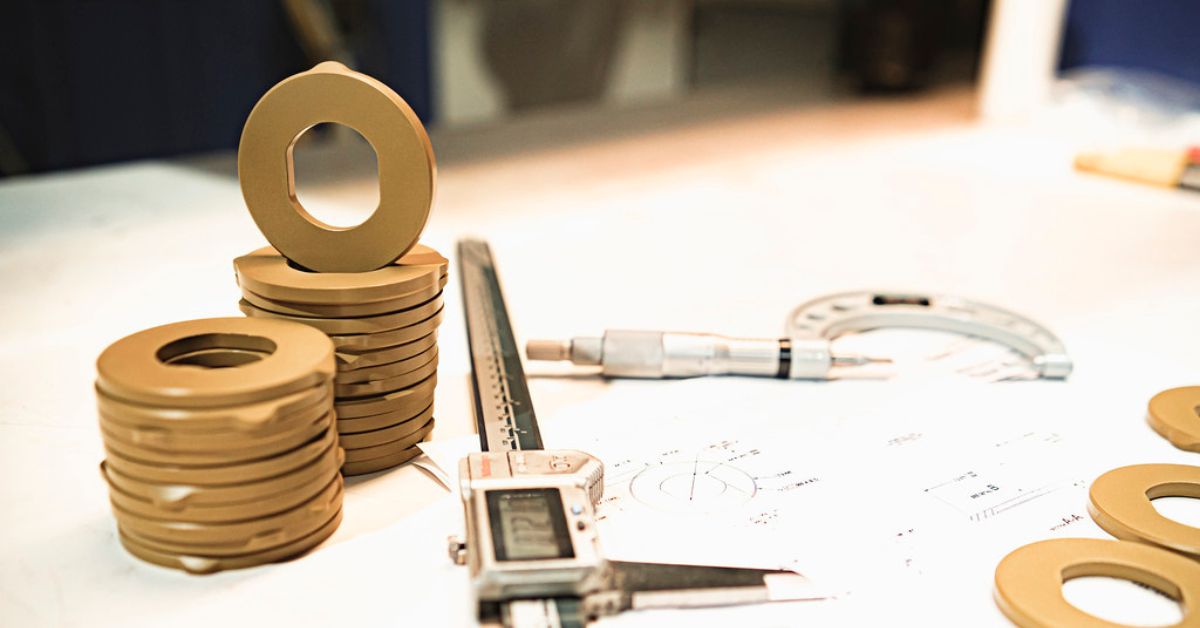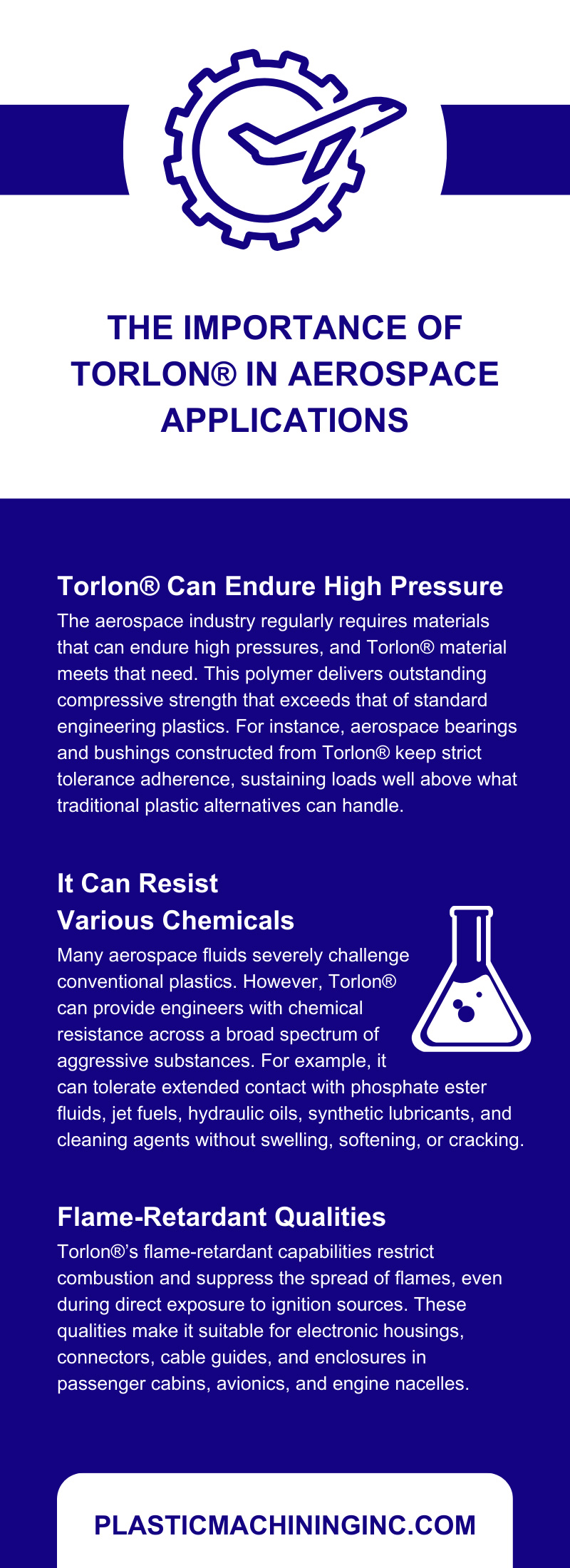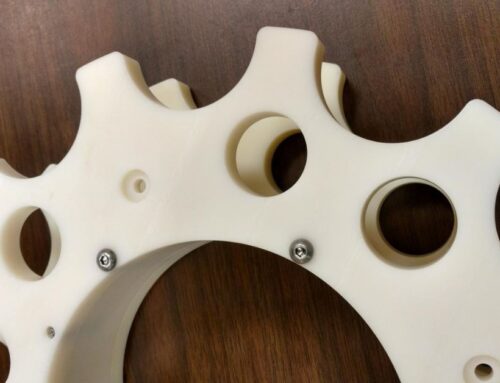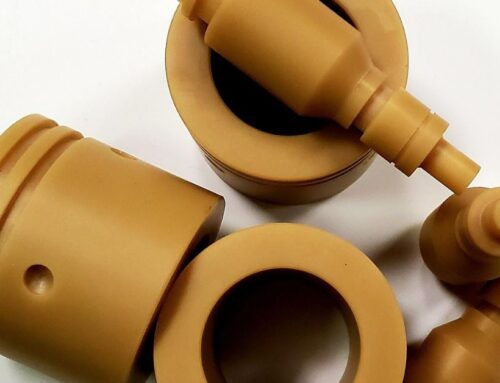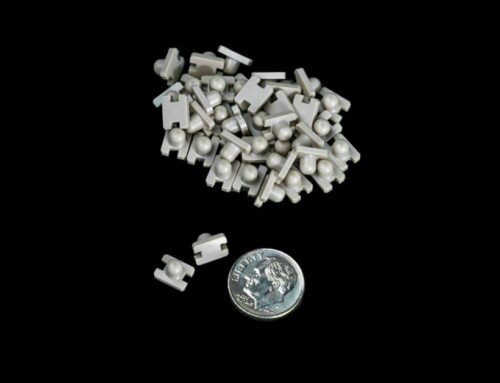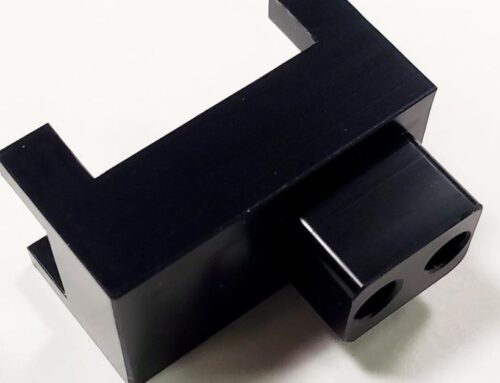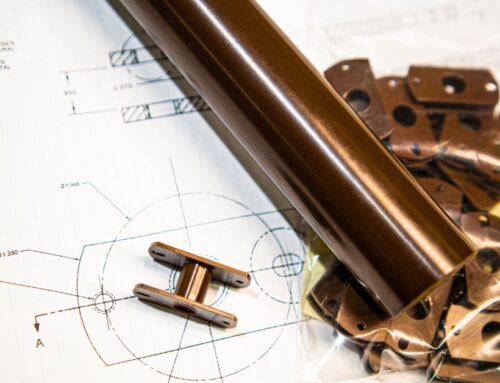Aerospace engineers often need high-performance products that can withstand challenges that conventional ones could not bear. One plastic that engineers have found particularly useful is Torlon®. This polyamide-imide sets benchmarks for reliability, longevity, and multi-property performance in aerospace components. Read on to learn about the importance of Torlon® in aerospace applications.
Torlon® Can Endure High Pressure
The aerospace industry regularly requires materials that can endure high pressures, and Torlon® material meets that need. This polymer delivers outstanding compressive strength that exceeds that of standard engineering plastics. For instance, aerospace bearings and bushings constructed from Torlon® keep strict tolerance adherence, sustaining loads well above what traditional plastic alternatives can handle.
Even in high-cycle fatigue environments within turbine and landing gear mechanisms, Torlon® components preserve their geometry, protecting sealing surfaces and minimizing the risk of catastrophic leakage or system failure. When subjected to rapid pressure fluctuations common in modern airframes, Torlon® consistently maintains its structure without micro cracking or creep.
Precision components built from Torlon® extend maintenance intervals for rotary actuators and servomechanisms, a critical advantage wherever reliability gaps mean costly unplanned downtime. Engineers can also enjoy significant weight savings without compromising integrity by substituting metal with Torlon® in parts exposed to cyclical loading.
It Can Resist Various Chemicals
Many aerospace fluids severely challenge conventional plastics. However, Torlon® can provide engineers with chemical resistance across a broad spectrum of aggressive substances. For example, it can tolerate extended contact with phosphate ester fluids, jet fuels, hydraulic oils, synthetic lubricants, and cleaning agents without swelling, softening, or cracking.
When engineers use Torlon® for products such as fluid management components, seals, manifold blocks, and check valves, they can withstand continuous exposure to caustic or acidic environments while maintaining their mechanical strength. The durability of Torlon® also allows parts to have long service lives when they experience exposure to aggressive cleaning agents during maintenance cycles.
Seals and housings made from Torlon® can lock out corrosive agents from sensitive electronic or hydraulic subsystems, which preserves functionality in harsh operational theaters. Torlon®’s resistance to various chemicals means that engineers can confidently install it in legacy and next-generation aircraft platforms, including those designed for exposure to alternative fuels and advanced lubricants.
The Plastic Has Flame-Retardant Qualities
The importance of Torlon® in aerospace applications also relates to its flame-retardant qualities. Flight-critical components must feature outstanding flame resistance to limit fires from spreading and withstand exposure to demanding thermal conditions.
Torlon®’s flame-retardant capabilities restrict combustion and suppress the spread of flames, even during direct exposure to ignition sources. These qualities make it suitable for electronic housings, connectors, cable guides, and enclosures in passenger cabins, avionics, and engine nacelles.
Choosing Torlon® helps protect vital electronics under emergency conditions. The plastic’s tendency to generate little smoke further safeguards crews and passengers.
Torlon® Is Lightweight Yet Strong
Reducing airframe mass directly contributes to fuel efficiency. Despite its low density, Torlon® delivers mechanical properties that approach those of metals. Its specific strength allows engineers to replace bronze, steel, or aluminum in many applications without burdening the overall payload.
Manufacturing flight hardware—such as bushings, gears, brackets, and fasteners—from Torlon® can help engineers achieve the dual goals of weight reduction and mechanical resilience. Mechanical parts gain a balance between impact resistance and tensile strength, which makes them suitable for both static and dynamic loads.
Adopting Torlon® means that every gram opens up operational windows for additional instrumentation, longer endurance, and higher efficiency. Each lightweight Torlon® component supports the broader goal of maximizing performance without adding surplus weight.
Torlon® Withstands High and Low Temperatures
Thermal extremes represent a routine aspect of aerospace operation, whether from the arctic stratosphere or the heat generated inside propulsion units. Torlon® again excels in this field by offering dimensional stability, with the ability to retain its mechanical properties from such low temperatures as -320.8 degrees Fahrenheit to highs up to 500 degrees.
This strength allows Torlon® to avoid brittle fractures at low temperatures and prevent softening or deformation at peak highs. The polyamide-imide structure blocks heat-induced creep or relaxation under load, which preserves the tight tolerances required for seals and couplings. Components fabricated from this polymer operate with minimal deviation in their critical dimensions throughout the entire mission timeline.
Things To Look for in a Torlon® Parts Supplier
Now that you know the advantages of using Torlon® as a material for aerospace components, you may wonder what you should look for in a potential parts supplier.
Extensive Experience
An important trait in a Torlon® parts supplier is extensive industry experience. Vendors with a proven history of delivering precision-engineered components can bring valuable insight and expertise to projects.
Their in-depth knowledge of material properties, manufacturing techniques, and application demands ensures that every part meets or exceeds performance standards. Partnering with such a supplier minimizes risks, streamlines production processes, and fosters innovative solutions tailored to the unique challenges of aerospace and other high-performance industries.
Effective Quality Control
Seek out vendors who place a focus on quality and precision when manufacturing aerospace components. Manufacturers can reduce the risk of failure in demanding applications by implementing rigorous protocols and adhering to stringent industry standards. Ensure you find a Torlon® parts supplier that can provide comprehensive assurance that each component meets your specifications.
Excellent Customer Service
Choosing a supplier that prioritizes excellent customer service is also critical to achieving operational success. A professional and attentive approach ensures clear communication, timely responses, and a deep understanding of client needs.
Try to find a vendor that focuses on building strong relationships and delivering tailored solutions so you can get the support you need. This commitment to service enhances client satisfaction, strengthens trust, and fosters long-term partnerships, driving mutual growth and success.
Buy Your Torlon® Aerospace Parts From Plastic Machining Inc.
Now you understand how Torlon® is reshaping the future of aerospace engineering. Its unique combination of high strength, chemical resistance, flame retardancy, and durability in hostile environments can help drive excellence in demanding aerospace projects.
When searching for a Torlon® parts supplier who embodies the traits listed above, consider Plastic Machining Inc. We create reliable, custom parts that will meet the needs of all your aircraft applications.
